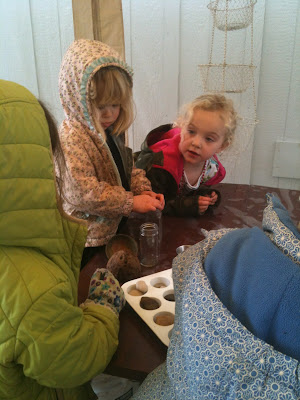No. No! NOOOOOO!
We have all heard a child say, yell, and even scream "No!" We talk about what other language the child can use instead, but what we often don't talk about is that sometimes it is okay for a child to say "No." At TPH, we encourage a child to say "No" in some situations, empowering that child to have a voice.
When a child is using an object and another child comes up and asks to use it, it is okay for the child to say "No! I'm using it!" Also, if a child comes up and takes an object that another child is using, the child can say, "No" or "Stop. I'm still using it!" This gives the child using that object the ability to use the object as long as she wants and to assert herself in a healthy way to keep the object and feel safe doing so.

There are other instances when a child has been hurt by another child or feels worried that another child is going to hurt him. In these instances we encourage the child to say "No! I don't like that" or "Stop!" or "Move back. I need space!" The child has the ability to stand up for himself in a positive, but strong way.
Giving children choices and allowing them to set limits empowers them to say "No," when they feel compelled to assert themselves. It does not mean they are right in every situation, but it is okay and should be encouraged for them to have a voice, to feel empowered, and to feel in control of their bodies.
It's okay for a child to say: "No. I don't want to play."
It's okay for a child to say: "No. I am busy."
It's okay for a child to stand up for herself, to peers and adults at times. Feeling able to and comfortable saying "No" now, helps children make more positive choices in the future and helps prevent them from engaging in high-risk behaviors. It also empowers them to say "No" to strangers and to unwanted touching. Being able to say "No" to outside pressures increases a child's self-esteem, self-awareness, and assertiveness skills. It helps children feel empowered to take control of their own lives, to set their own limits, and to make positive decisions throughout their entire lives!
When a child is using an object and another child comes up and asks to use it, it is okay for the child to say "No! I'm using it!" Also, if a child comes up and takes an object that another child is using, the child can say, "No" or "Stop. I'm still using it!" This gives the child using that object the ability to use the object as long as she wants and to assert herself in a healthy way to keep the object and feel safe doing so.

There are other instances when a child has been hurt by another child or feels worried that another child is going to hurt him. In these instances we encourage the child to say "No! I don't like that" or "Stop!" or "Move back. I need space!" The child has the ability to stand up for himself in a positive, but strong way.
Giving children choices and allowing them to set limits empowers them to say "No," when they feel compelled to assert themselves. It does not mean they are right in every situation, but it is okay and should be encouraged for them to have a voice, to feel empowered, and to feel in control of their bodies.
It's okay for a child to say: "No. I don't want to play."
It's okay for a child to say: "No. I am busy."
It's okay for a child to stand up for herself, to peers and adults at times. Feeling able to and comfortable saying "No" now, helps children make more positive choices in the future and helps prevent them from engaging in high-risk behaviors. It also empowers them to say "No" to strangers and to unwanted touching. Being able to say "No" to outside pressures increases a child's self-esteem, self-awareness, and assertiveness skills. It helps children feel empowered to take control of their own lives, to set their own limits, and to make positive decisions throughout their entire lives!



So excellent! Thanks for this lovely post and I adore the pictures too!
ReplyDeleteThank you! I am always trying to take pictures of the Preschoolers asserting themselves, but it's hard to be present and ready to step in and take pictures at the same time.
ReplyDelete